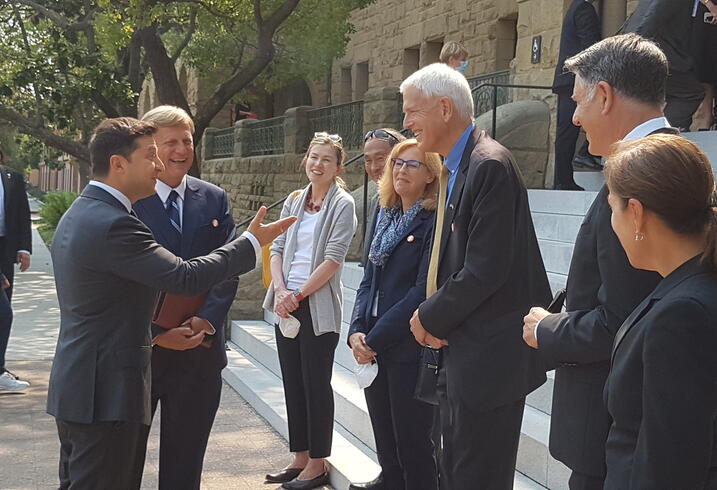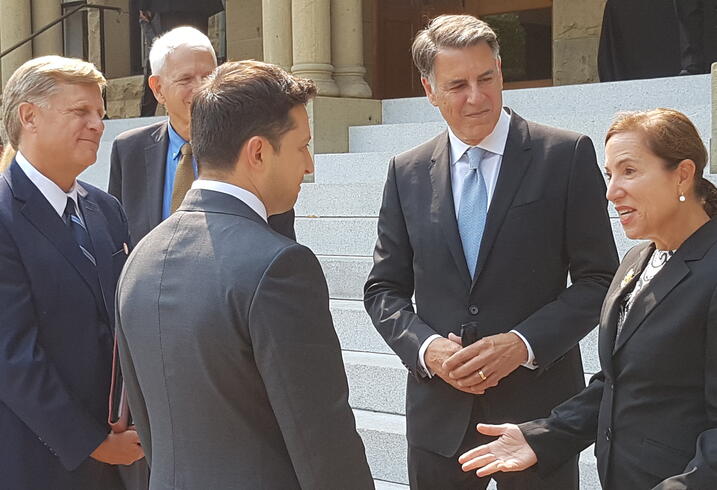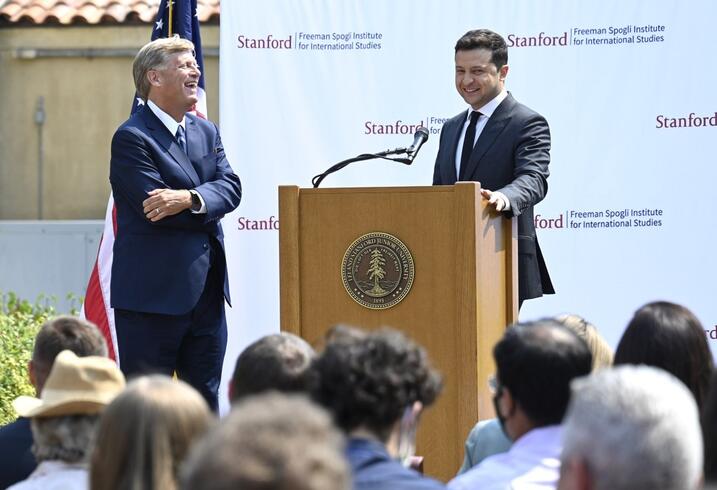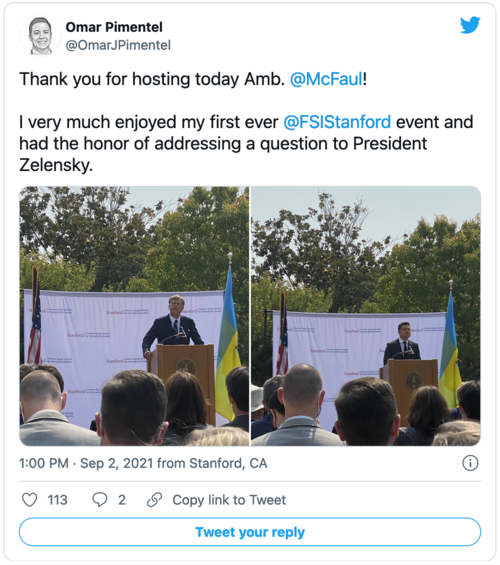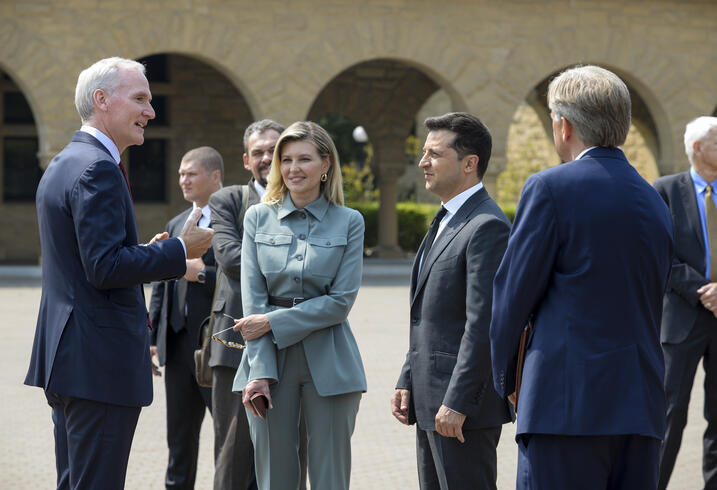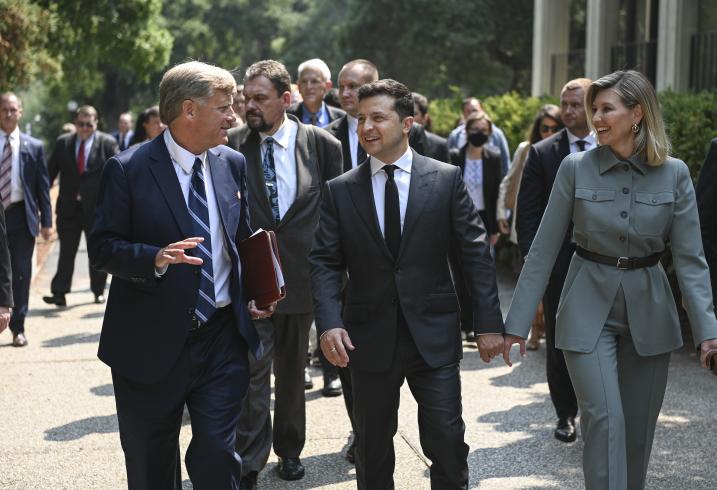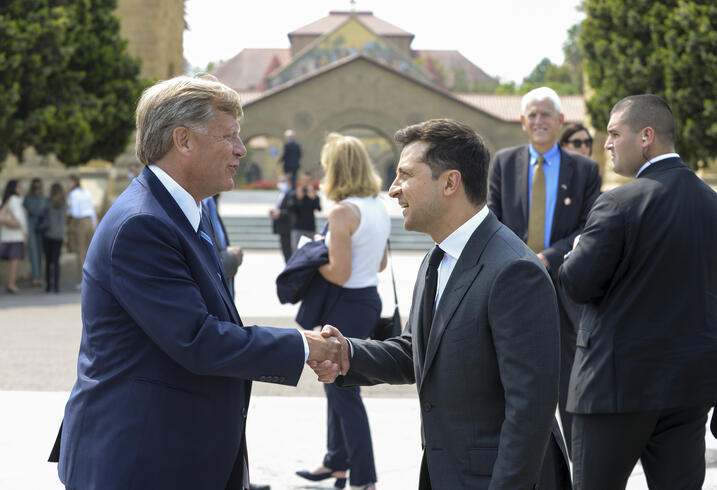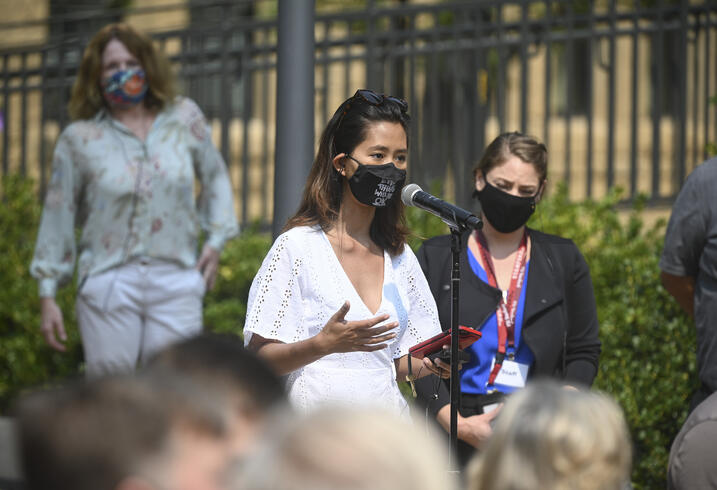Five Things FSI Scholars Want You to Know About the Threats Our World Is Facing
A warming planet. Backsliding in democracy at home and abroad. Competition with China. And active war in Europe. Broadening conflicts in the Middle East.
The world today is facing no shortage of overlapping, multilateral challenges. At a recent panel titled, “Global Threats Today: What's At Stake and What We Can Do About It,” scholars from the Freeman Spogli Institute for International Studies (FSI) had an opportunity to delve deeper into what the data says about how these global threats are evolving, and how we should be thinking about how to address them.
The discussion, which was held as part of Stanford University's 2024 Reunion and Homecoming weekend, was moderated by Michael McFaul, director of the Freeman Spogli Institute, and featured Marshall Burke, Didi Kuo, Amichai Magen, Oriana Skylar Mastro, and Steven Pifer.
In the highlights below, each scholar shares what they wish people understood better about climate change, the war in Ukraine and Russia's aggression, China's strategy for building power, the health of American democracy, and how the fighting between Israel and Hamas fits into the geopolitical struggle between democracies and autocracies.
Their full conversation can be heard on the World Class podcast, and the panel can be watched in its entirety on YouTube.
Follow the link for a full transcript of "Global Threats Today: The 2024 Edition."
Illiberal Actors Are on the Move | Amichai Magen
Around the world, we are seeing a new axis of influence coalescing. Some have called it the "axis of misery" or the "axis of resistance." It is composed of Russia and Iran and North Korea, with a lot of Chinese involvement as well. It is transforming our international system in unbelievable ways. It is united by the desire to dismantle the liberal international order, and we're starting to see the nature and the interconnectivity of this new axis of chaos much more clearly.
You see North Korean soldiers fighting for Putin in Ukraine. You see Putin helping the Houthis attack international Western shipping in Yemen. We see North Korean tunnel technology turn up in Lebanon with Hezbollah and then with Hamas in Gaza. The interconnectivity is something that we really need to know much more about.
Historically, emperors, kings, dukes, used to spend 50% of their resources on preparing for war or waging war. But in the post-Second World War era, we built a critical norm that we've called the liberal international order. And the miracle of the liberal international order is that we've managed to take global averages of defense spending from about 50% to a global average of about 7%. And the resulting surplus wealth has allowed us to invest in education, health, and scientific discovery.
What is at stake now is the possibility of a return of a norm where states are destroyed and disappear. And we have currently three states in the international system, at the very least — Ukraine, Israel and Taiwan — that are at risk of annihilation. To that end, we must articulate a positive strategic vision for the Middle East that will strive towards a two state solution, that would give the Palestinian people the dignity and the freedom that they deserve alongside a safe and secure Israel, and that will leverage the new spirit of cooperation that exists in the Middle East.
If we allow the norm of the non-disappearance of state to erode and collapse, we will go back to the law of the jungle, where we will have to spend so much more money on the wrong things. That is what is at stake in Ukraine, in the Middle East, and with Taiwan.

Challenges to Democracy Come From Within | Didi Kuo
Many people think that the threat to democracy comes from outside our borders, particularly from countries like Russia and China that are asserting themselves in new and aggressive ways.
But the real threat to democracies that we're seeing across the globe is coming from within. Leaders come to power through democratic means, but then they begin to erode power from within. They attack the electoral system and the process of democratic elections, and they take power from other branches of government and aggregate it to themselves within the office of the executive.
The good news is there are examples of countries like France, Brazil, and Poland where illiberal leaders have been stopped by pro-democracy coalitions of people who came together. These coalitions don't necessarily agree with each other politically, but they've come together and adapted in order to foreclose on these anti-democratic forces.
That flexibility and adaptability is the reason democracies succeed. We see this over and over again in the the United States. When our institutions have become out of date, we've changed them. We extended suffrage, first to Black Americans who were formerly enslaved, then to women, then to Native Americans. We eliminating poll taxes and rethought what it means to have a multiracial democracy. We have a long track record of making changes.
Today in 2024, some of our democratic institutions are antiquated and don't reflect our contemporary values. This is a moment where we should lean into that flexible strength of democracy and think about institutional reforms that will both strengthen our system against illiberal creep and help us better achieve the ideals that we aspiring to as a people.

Ukraine Is Not Fated to Lose | Steven Pifer
There's a narrative that's taking place that Russia is winning the war, Ukraine is losing, and it's only a matter of time. And it is true that Russia has captured a bit more territory than they occupied at the start of the year. But they've only achieved that at enormous cost.
As of September, the Pentagon says Russia had lost 600,000 dead and wounded soldiers. To put that in context, in February of 2022 when this major invasion began, the total Russian military — not just the army, but the total Russian military — was 1.1 million people. And the British Ministry of Defense earlier this week assessed that Russia now is losing 1,200 soldiers killed or severely wounded per day. You have to ask how long that's sustainable.
When I talk to Ukrainians, they still regard this war as existential. They're very determined to win, and we need to do a better job of supporting that. A stable and secure Europe is vital to America's national security interests, and you're not going to have a stable and secure Europe unless there's a stable and secure Ukraine. So we need to both provide them the weapons they need and relieve some of the restrictions we currently have and allow the Ukrainians to use those weapons to strike military targets in Russia.
Because we have to ask ourselves: what does an emboldened Vladimir Putin do if he wins in Ukraine? I don't think his ambitions end with Ukraine, perhaps not even with the post-Soviet space. There's going to be a much darker Russian threat hovering over Europe if Putin wins. So let's not count the Ukrainians out.

Steven Pifer
China Isn't Going Away Anytime Soon | Oriana Skylar Mastro
There is a lot of discussion right now about the fact that the economy in China is slowing down and its demography is undergoing significant changes. What I'm here to tell you is that the challenge of China is not over, and is not going to be over any time soon. China has built power in a different way than the United States, and we have to reassess how we understand that power if we want to effectively deter, blunt, and block them from acting out in ways that threaten our partners and allies.
Since the 1990s, China has developed a significant amount of political, economic, and military power. They've gone from having an economy smaller than France’s to the second largest in the world. They've gone from not being involved in international institutions to a great degree, not even having diplomatic relations with major countries like South Korea, to now having stronger and greater diplomatic networks, especially in Asia, than the United States.
What we really need to understand is that the U.S.-China competition is not about the United States or about China; it's about the rest of the world, and how the rest of the world sees us and how China interacts with us. The balance of power is shifting, and we have to be a lot smarter and a lot faster if we want to make sure it shifts in favor of our interests.
The United States hasn't had a comprehensive strategy towards the developing world in a long time. And we are running out of time to get that balance right in Asia. We don't have the right stuff. We don't have it in the right numbers, and it's not in the right place. Some of this is about deterring war over Taiwan, but it's also about generally maintaining peace and stability in Asia.

Oriana Skylar Mastro
We're Doing Better (But Not Enough) on Climate Change | Marshall Burke
Many people don't recognize how much progress we're actually making on climate issues. Emissions have fallen by 20% since 2005. We're actually speeding up the amount of substantial progress being made in reducing greenhouse gas emissions and dealing with the core climate change problem, which is the human emission of greenhouse gasses.
In the United States, the Inflation Reduction Act and the subsequent implementation of various rules the Biden administration has championed has given a huge boost in transitioning our economy to greener energy technologies, transportation technologies, and other kinds of infrastructure. We're moving a lot of cash to get that done, and the president is trying to get as much of it out the door as he can before his term ends.
Globally, the progress has been less rapid. Emissions are roughly flat. But overall, we're still making progress. I co-teach an undergraduate class on climate change, and we've had to update our slides on how much warming we're expecting over the next century. We thought it was going to be four degrees Celsius. Now we think it's going to be something between two and three degrees Celsius.
But the flip side of that is that we're still going to get warming of two to three degrees Celsius. We're already experiencing warming of about a degree Celsius, which is about two degrees Fahrenheit, and it's projected that we're going to get another three to five degrees Fahrenheit by the end of the century. That is a lot of warming, and we are not prepared to deal with it. We need to do much more on mitigation and much more on adaptation if we're going to meet the realities of living in a changing climate.
So we've had progress on the one hand, but there's still a lot of work left to do in the coming decades.

Read More
![[Left to right]: Michael McFaul, Marshall Burke, Steven Pifer, Oriana Skylar Mastro, Didi Kuo, and Amichai Magen on stage.](https://fsi9-prod.s3.us-west-1.amazonaws.com/s3fs-public/styles/895x498/public/2024-10/fsi_reunion_2024_panel_hero.png?h=c4d9845d&itok=qQV3guUp)
At a panel during Stanford's 2024 Reunion weekend, scholars from the Freeman Spogli Institute for International Studies shared what their research says about climate change, global democracy, Russia and Ukraine, China, and the Middle East.

![Josep Borrell [right] in discussion with Michael McFaul [left].](https://fsi9-prod.s3.us-west-1.amazonaws.com/s3fs-public/styles/707x483/public/2024-05/josep_borrell_eu_democracy_5_hero.png?itok=B_fbY_pc)



![Josep Borrell [right] in discussion with Michael McFaul [left].](https://fsi9-prod.s3.us-west-1.amazonaws.com/s3fs-public/styles/1300x1300/public/2024-05/josep_borrell_eu_democracy_5_hero.png?itok=pM6CT1oe)




![Michael McFaul [left], the director of the Freeman Spogli Institute for International Studies, speaks with Josep Borrell [right], High Representative of the European Union for Foreign Affairs and Security Policy, during an event at Stanford University on May 13, 2024.](https://fsi9-prod.s3.us-west-1.amazonaws.com/s3fs-public/styles/895x498/public/2024-05/josep_borrell_eu_democracy_hero.png?h=c4d9845d&itok=TJ5M_9hJ)








